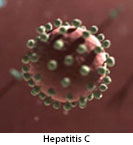
Hepatitis B and C during Pregnancy
What are hepatitis B and C?
Hepatitis B and hepatitis C are viral infections of the liver. The liver is one of the largest organs and a very important part of your baby’s body. Some of the functions of the liver include:
- It helps the body get rid of harmful substances and some medicines.
- It makes bile, which helps the body digest fats.
- It stores sugar, which the body uses for energy.
- It makes many proteins, which are the building blocks for all cells in the body.
When you have hepatitis, the liver is irritated (inflamed). It may be swollen and tender and may stop working properly
What is the cause?
Hepatitis B and C are caused by 2 different viruses. If you are pregnant and you are infected with the virus, you can pass the infection to your baby when the child is born.
What are the symptoms?
You may not have any symptoms, or you may not have symptoms for several weeks or months after you are infected with one of the viruses. Even if you don't have symptoms, the virus can still damage your liver over time. If you do have symptoms, they may include:
- Yellowish skin and eyes (jaundice)
- Feeling tired all the time
- Dark urine
- Pain just below the ribs on your right side, especially if you press there
- Bowel movements that are whitish or light yellow and may be looser than normal
- Loss of appetite
- Nausea and vomiting
- Muscle and joint pain
- Fever
If your baby is infected during birth, he usually won't have any symptoms, but his liver will be damaged over time, which is why treatment soon after birth is so important.
How is it diagnosed?
Your healthcare provider will ask about your symptoms and medical history and examine you. You will have blood tests. If blood tests show that the liver is not working normally, you will have tests to find out if a virus is causing the problems. The tests will also determine the type of virus causing the infection. Testing for your baby often has to wait until several months after birth.
How can I help keep my baby from getting hepatitis B or C during pregnancy?
If your baby is exposed to the hepatitis B virus during delivery, a shot of HBIG (hepatitis B immune globulin) and the first dose of the hepatitis vaccine will be given to the baby within 12 hours after birth. After the first dose is given in the hospital, the next dose is given at 1 to 2 months of age. The last dose is usually given by the time your baby is 1 year old. Your baby will have a hepatitis B blood test 1 to 2 months after the last shot to make sure he is protected.
If you are infected with the hepatitis C virus, your baby usually will be tested when he or she is at least 18 months of age. In some children, the infection goes away without treatment by 2 years of age. Other children have a mild liver disease. A child with a more severe infection may be referred to a liver specialist. The specialist will talk with you about risks and benefits of treatment. Your child will need frequent blood tests and checkups.
Breast-feeding is thought to be safe for babies whose mothers have hepatitis B or C. If you have cracked or bleeding nipples, breast-feeding is not recommended until your nipples have healed.
How can I help take care of my baby?
Follow your child’s healthcare provider's instructions. Ask your provider:
- How and when you will get your child’s test results
- If there are activities your child should avoid
- How to take care of your child at home
- What symptoms or problems you should watch for and what to do if your child has them
Be sure your baby gets routine vaccines.
Make sure you know when your child should come back for a checkup. Keep all appointments for provider visits or tests.
Last modified: 2017-04-11
Last reviewed: 2017-04-11

